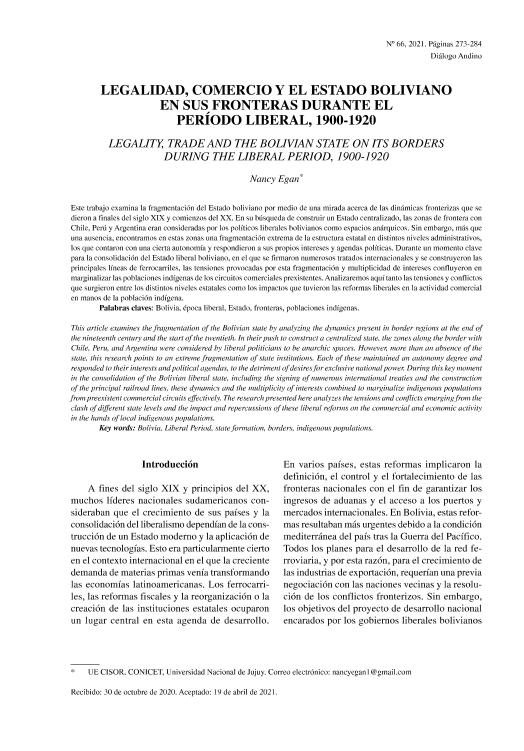Artículo
Este trabajo examina la fragmentación del Estado boliviano a través de una mirada sobre las dinámicas fronterizas que se dieron a finales del siglo XIX y comienzos del XX. En su búsqueda de construir un Estado centralizado, las zonas de frontera con Chile, Perú y Argentina eran consideradas por los políticos liberales bolivianos como espacios anárquicos. Sin embargo, más que una ausencia, encontramos en estas zonas una fragmentación extrema de la estructura estatal en distintos niveles administrativos, los cuales contaron con una cierta autonomía y respondieron a sus propios intereses y agendas políticas. Durante un momento clave para la consolidación del estado liberal boliviano, en el que se firmaron numerosos tratados internacionales y se construyeron las principales líneas de ferrocarriles, las tensiones provocada por esta fragmentación y multiplicidad de intereses confluyeron en marginalizar las poblaciones indígenas de los circuitos comerciales prexistentes. Analizaremos aquí tanto las tensiones y conflictos que surgieron entre los distintos niveles estatales, como los impactos que tuvieron las reformas liberales en la actividad comercial en manos de la población indígena. This article examines the fragmentation of the Bolivian state by analyzing the dynamics present in border regions at the end of the nineteenth century and the start of the twentieth. In their push to construct a centralized state, the zones along the border with Chile, Peru, and Argentina were considered by liberal politicians to be anarchic spaces. However, more than an absence of the state, this research points to an extreme fragmentation of state institutions. Each of these maintained an autonomy degree and responded to their interests and political agendas, to the detriment of desires for exclusive national power. During this key moment in the consolidation of the Bolivian liberal state, including the signing of numerous international treaties and the construction of the principal railroad lines, these dynamics and the multiplicity of interests combined to marginalize indigenous populations from preexistent commercial circuits effectively. The research presented here analyzes the tensions and conflicts emerging from the clash of different state levels and the impact and repercussions of these liberal reforms on the commercial and economic activity in the hands of local indigenous populations.
Legalidad, comercio y el estado boliviano en sus fronteras durante el período liberal, 1900-1920
Título:
Legality, trade and the bolivian state on its borders during the liberal period, 1900-1920
Fecha de publicación:
12/2021
Editorial:
Universidad de Tarapacá
Revista:
Diálogo Andino
ISSN:
0716-2278
e-ISSN:
0719-2681
Idioma:
Español
Tipo de recurso:
Artículo publicado
Clasificación temática:
Resumen
Palabras clave:
Bolivia
,
Época Liberal
,
Estado
,
Fronteras
,
Poblaciones indígenas
Archivos asociados
Licencia
Identificadores
Colecciones
Articulos(UE-CISOR)
Articulos de UNIDAD EJECUTORA EN CIENCIAS SOCIALES REGIONALES Y HUMANIDADES
Articulos de UNIDAD EJECUTORA EN CIENCIAS SOCIALES REGIONALES Y HUMANIDADES
Citación
Egan, Nancy; Legalidad, comercio y el estado boliviano en sus fronteras durante el período liberal, 1900-1920; Universidad de Tarapacá; Diálogo Andino; 66; 12-2021; 273-284
Compartir




